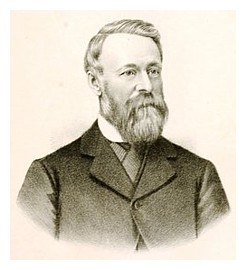

PARKER, Sen. Horace G. 

PARKER, COON, BURR, TOBIN, NOYES, SIRRINE, GRAY, RANDALL
Posted By: Sharon R Becker (email)
Date: 11/16/2014 at 10:07:47
Horace G. Parker
July 20, 1829 ~ December 16, 1897Senator H.G. Parker, of Mason City, has been so long identified with the best interests of Cerro Gordo county, that his name is inseparable from all her enterprises and projects for future well-being. All his career, since he cast his lot in Iowa, has been signally marked by his disinterested efforts for her general and local prosperity. Mr. Parker is a reformer in the best sense of the term; he judges measures by long observation of their influence on society, and endorses no general principle which promises no permanent benefit to the institutions in which he is most intimately interested, as a man and citizen. Personal aggrandizement is his special aversion; human merit has no claim on his attention, unless characterized by self-abnegation. Mr. Parker was born in Oswego Co., N.Y., July 20, 1829.
His father, Patten Parker, was born Sept. 3, 1793, in Argyle, Washington Co., N.Y., and died Feb. 25, 1846. His mother, Sally (Burr) Parker, was born April 1, 1793, in Granby, Hartford Co., Conn. She died Jan. 23, 1873. Their marriage took place in Litchfield, Herkimer Co , N.Y., Oct. 20, 1816. They had three daughters and one son. The senior Parker spent his life in the pursuit of agriculture.
H.G. Parker was carefully reared on his father's farm and received a substantial education. In June, 1855, he turned his face westward, and settled upon Cerro Gordo county as a field likely to afford scope to his energies and abilities. This section was then the Utopia of the pioneer; the broad stretch of prairie seemed a special boon to the early settler, who came here with little beside hope and manly strength as the basis of a successful future. In the fall of 1855 Mr. Parker located at Clear Lake. His connection with the politics of the county commenced with his advent, he being elected one of the first justices of Clear Lake township. During his residence at Clear Lake, he opened and cultivated a farm on the north shore of the lake. In 1859 he was elected county treasurer and recorder, and removed to Mason City to enter upon the duties of his office, Jan. 1, 1860. He served two years, and, Jan. 1, 1862, associated with C.W. Tobin, a compositor in the office, purchased the Cerro Gordo Republican, a paper established in 1861. In the autumn ensuing, Mr. Tobin enlisted in the Union Army, and Mr. Parker was left to the mechanical as well as editorial management of the Republican. The patriotism of printers is a well remembered fact among publishers, and the dearth of typos sometimes interfered with the regularity of the issue of the Republican but it was a welcome visitor in the ranks of Iowa volunteers, who eagerly sought for news from home. At the beginning of 1863, Silan Noyes, of Clear Lake, an experienced printer and newspaper man, became a partner in the publication of the paper, but he retired at the end of the same year, and Mr. Parker operated alone up to the summer of 1867. His connection with the paper covered the most eventful period of the Nation's history, beginning with the outbreak of the rebellion, and terminating with the restoration of the National authority. In 1867 he sold the paper to Silan Noyes and S.A. Sirrine.
In 1862 Mr. Parker was appointed deputy clerk of the district courts and clerk of the board of supervisors. In 1863, after the death of H.B. Gray, clerk of the court, he was elected to fill the vacancy, and held the post until January, 1865, declining reelection on account of his editorial obligations. In the fall of 1870 he was elected one of three supervisors, who were to constitute the board instead of one official from each civil township. Mr. Parker drew the short term and acted one year. At the same time he was councilman of Mason City, and a member of the school board of the independent school district. His labors in the latter capacity have their reward in the elegant school building whose erection is due to the efforts of Mr. Parker and his co-adjutors. In 1870 he built the flouring mill on Willow creek, known as the Parker Mills, at a cost of $12,000. He re-appeared in public life in 1881, when he was elected to fill a vacancy in the State Senate, where his official record is one of honor to his manhood and credit to his constituency.
He was married in 1861 to Mary A., daughter of Luke Coon of Wisconsin. Mr. and Mrs. Parker have five children — Maud G., Laura L., H. Earl, Carl A. and Mary M.
Mr. Parker has built his fortune from a small foundation. He ranks fairly with the capitalists of the northwest, and owes his prosperity to judicious management. In company with A.T. Parker, he is engaged in adding substantially to the beauty and permanent growth of Mason City, by the erection of an opera house, an investment of about $25,000.
NOTE: Mary A. (Coon) Parker was born May 4, 1846, and died July 30, 1915. Maude Gertrude (Parker) Randall was born January 13, 1866, and died December 21, 1930. Carl Arthur Parker was born March 31, 1873, and died July 26, 1961. They and Horace G. Parker were interred at Elmwood-St. Joseph Cemetery, Mason City, Iowa.
SOURCE:
History of Franklin and Cerro Gordo Counties, Iowa Pp. 714-15. Union Publ. Co. Chicago. 1883.Transcription and note by Sharon R. Becker, November of 2014
(More photographs on webpage, link below)

Sen. Horace G. Parker biography
Cerro Gordo Biographies maintained by Lynn Diemer-Mathews.
WebBBS 4.33 Genealogy Modification Package by WebJourneymen